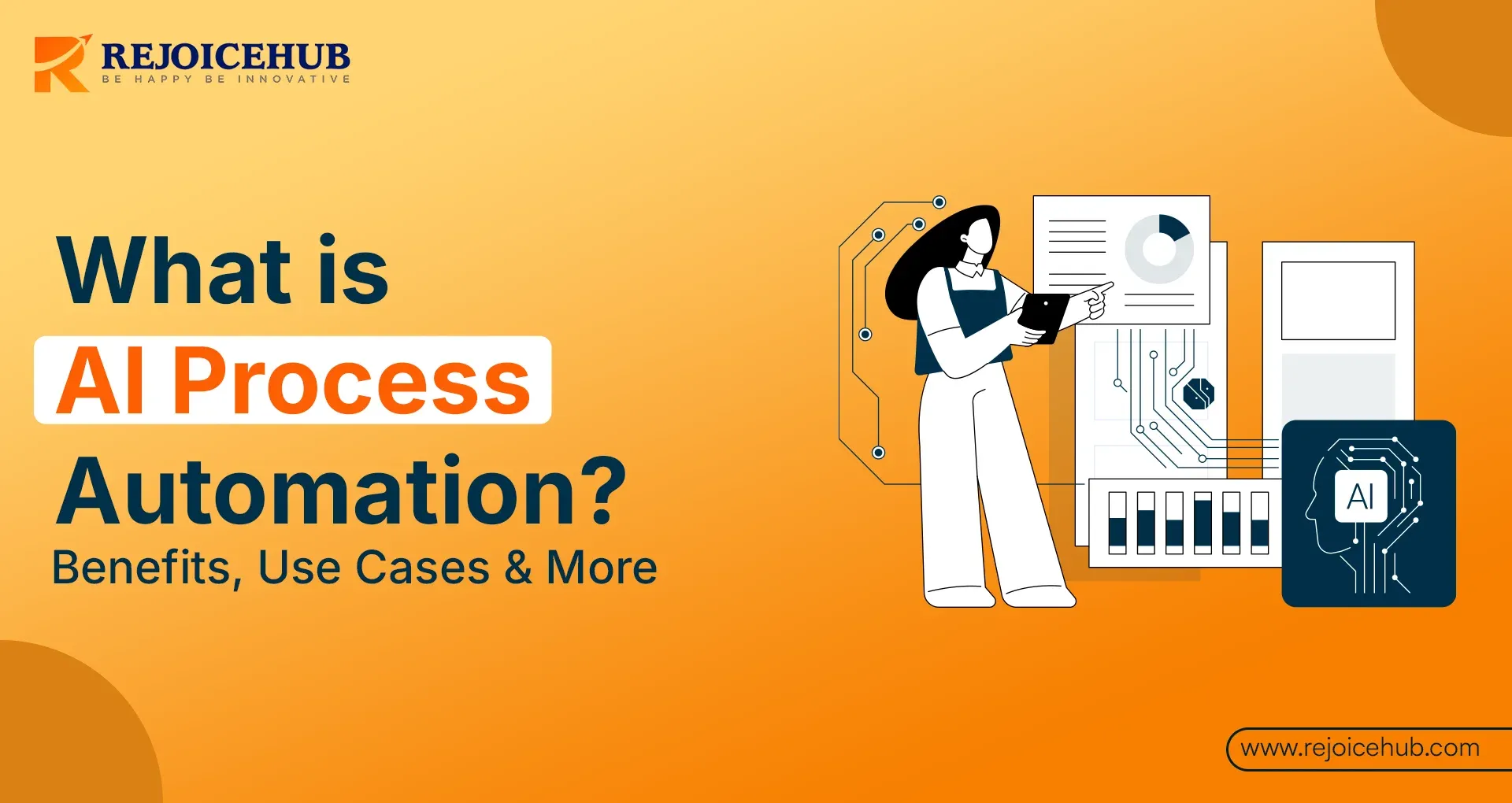
Just imagine that you can easily automate some of your work, not just simple tasks but also complex decision-making processes; this does not sound realistic because decision-making processes typically require human intelligence. But AI Process Automation can automate as simple as well as complex tasks.
As an AI tools expert who has tested and implemented many automation tools across industries, I can confidently say this technology is not just a trend; it's a transformational force, and many experts believe that the future of AI automation will be quite reliable and successful.
Today in this detailed article, we will learn what AI process automation truly is, how it works, its tangible benefits, the challenges you might face, popular use cases, and the top tools you can explore. Everything you read here is based on tested insights and real-world applications.
Quick Summary
Actually, AI Process Automation combines AI technologies with traditional automation, it provides many benefits to businesses like increasing efficiency in their operations, and provides facilities like cost saving and improved accuracy. As we know, in 2025, AI systems are still evolving, so they also have many challenges, like data quality issues or management issues.
AI automation processes are being used a lot in Finance, HR, IT, and manufacturing sectors. Nowadays, trends like Hyperautomation, Agentic AI, low-code/no-code platforms, and blockchain integration are also increasing. Naturally, the trust of businesses is increasing a lot in AI automation.
Our Focus in this Article:
- What is AI Process Automation, and how does it work?
- Benefits and challenges of AI Process Automation
- Latest Trends and Best in AI Process Automation
- Bonus Tip: You can deploy which AI automation process in your business based on my experience.
What is AI Process Automation?
Generally, AI Process Automation refers to the use of artificial intelligence technologies such as machine learning (ML), natural language processing (NLP), and large language models (LLMs) to automate and enhance business processes. Unlike traditional process automation, which follows predefined rules, AI-based systems can learn from data, adapt, and make intelligent decisions. This process automation is also very good because it learns from your business workflow and keeps increasing your working accuracy.
AI automation processes' platform can generate from code snippets to auto-approving invoices or routing customer enquiries, AI is making automation more dynamic and responsive than ever before.
This is the main reason why my business clients are shifting from traditional workflow to AI process automation.
How Does AI Process Automation Work?
You must also be curious about how AI Process Automation Works and what kind of technologies it uses.
1. Predictive AI: It identifies patterns and trends in real-time, helping forecast demand or detect requirements. This gives businesses an idea about which product or service has the most demand in the market. This way, businesses can use it at the right time and gain a lot of profit.
2. Generative AI: It generates content, application code, or automated workflows from natural language prompts. Apart from this, generative AI also helps businesses in their different operations due to their large datasets.
3. Assistive AI: It supports human decision-making by analyzing context and suggesting actions. With this, you can have a personal assistant or manager of your business who will help your staff a lot in decision making.
For example, Many big hospitals are automating manual discharge approval. Apart from this, popular hospitals like Manchester General Hospital are also using AI automation for disease diagnosis and overall, AI has had a very positive impact in the healthcare sector.
Benefits of AI Process Automation
According to McKinsey's reports, whenever a business uses AI Process Automation, there is a 40% efficiency increase in the operations of businesses, so let's understand this in a little more detail.
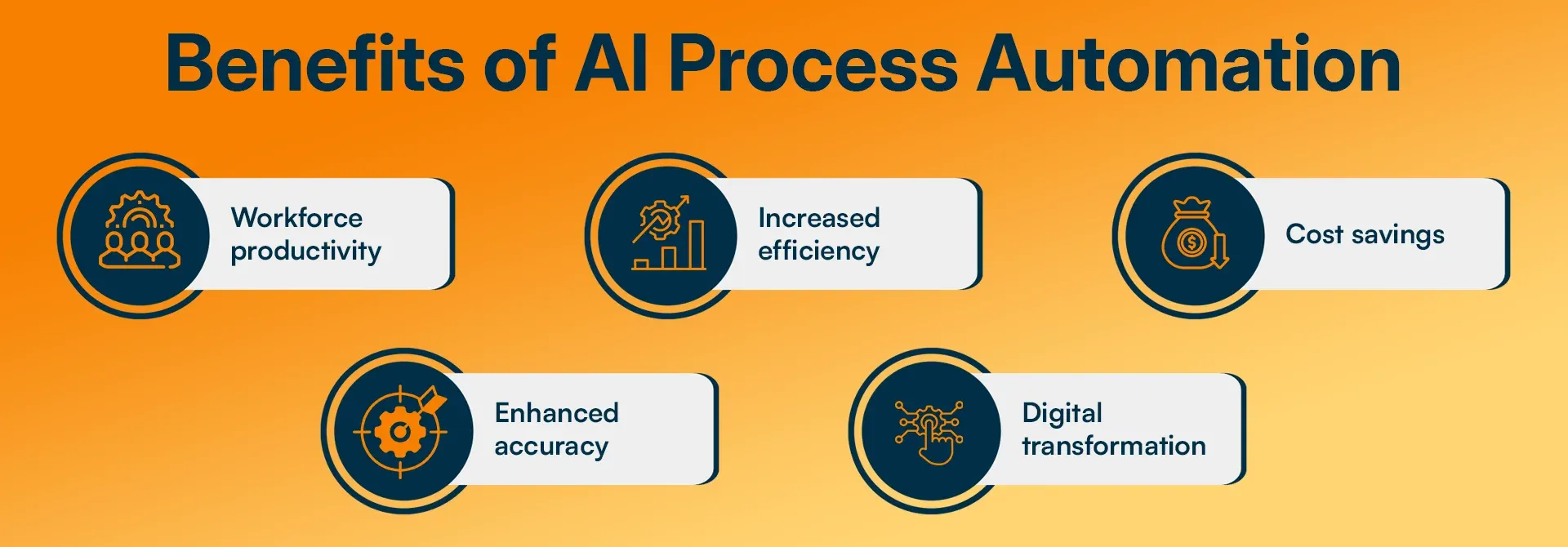
1. Workforce Productivity
By automating repetitive tasks, employees can focus on creative and strategic work. According to McKinsey, automation can free up to 60-70% of employees' time.
2. Enhanced Accuracy
As we know, manual tasks are prone to errors, and it's so common because Humans can make mistakes, but AI reduces mistakes by ensuring consistency and learning from historical data to avoid repeated faults.
3. Increased Efficiency
You know most tasks that took days can now be completed in hours using AI tools like Copilot. This means AI automation can provide faster workflows and better output.
4. Digital Transformation
AI platforms speed up the modernization of business operations, breaking down silos and enabling cross-functional automation.
5. Cost Savings
With fewer manual errors and faster operations, companies reduce operational costs significantly. 44% of business leaders reported cost savings after AI adoption.
Challenges of AI Process Automation
As we know, AI tools and platforms are still evolving, and deploying and managing AI process automation poses many challenges. Let’s understand them in detail.
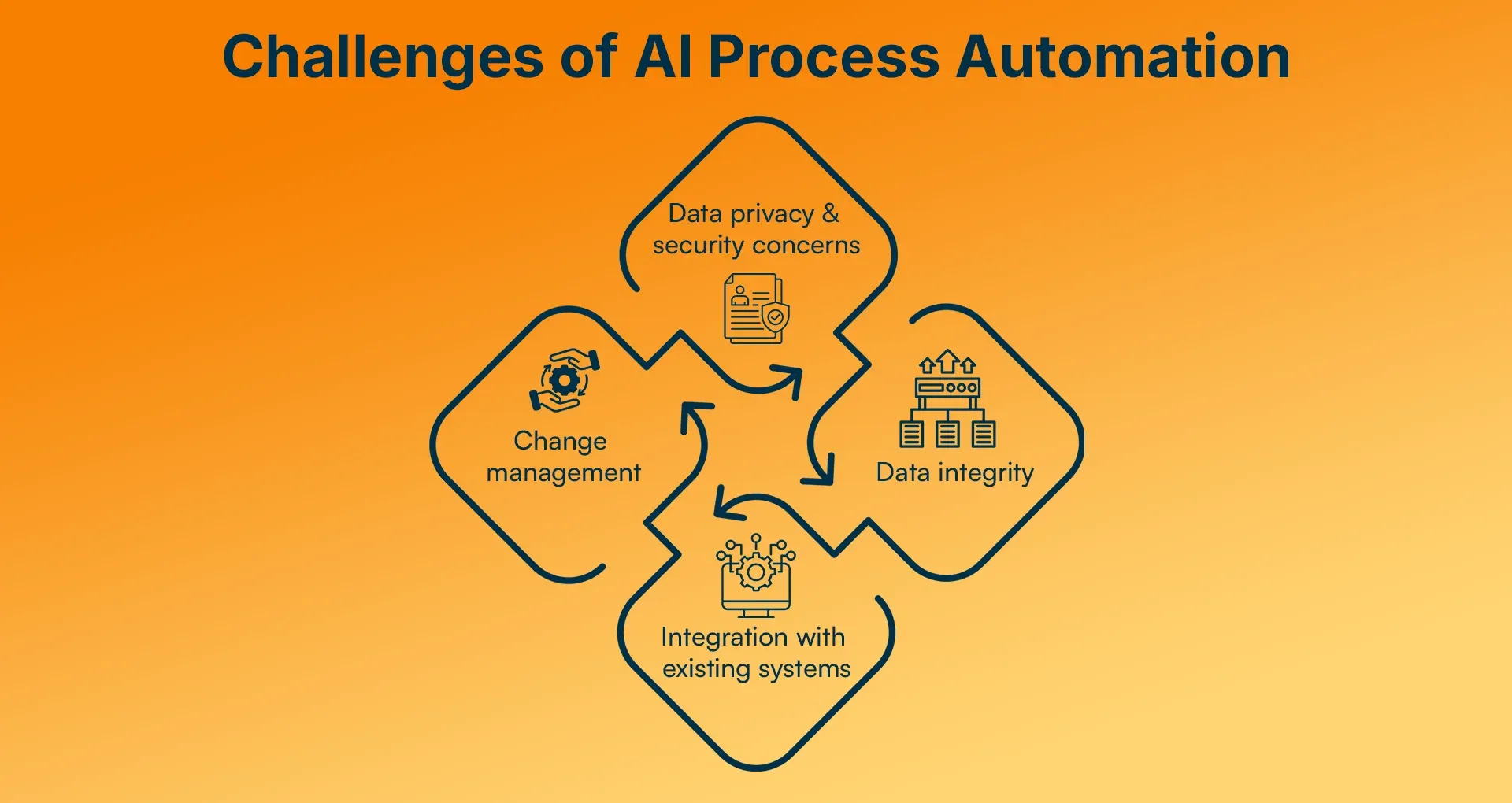
1. Data Privacy & Security
As we know, AI needs data, and often it’s sensitive. AI partner companies need to follow a proper framework, and governance models must be in place to ensure data protection.
2. Data Integrity
For AI to function optimally, input data must be clean, structured, and accurate. Many organizations struggle with low or inconsistent data sources. This is why businesses always prefer trusted AI software implementation firms like RejoiceHub to maintain data integrity.
3. Integration with Existing Systems
Some legacy systems may not seamlessly integrate with AI tools. You try to choose platforms that offer easy integration with tools like SAP, HubSpot, and Microsoft.
4. Change Management
Most employees might resist AI due to the fear of job loss. Training and upskilling programs are essential to drive adoption in workflow management.
Also Read: The Role of AI Agents in the Future of Business Automation
Use Cases of AI Process Automation
AI process automation is so useful that you may have already planned to implement it in your businesses, but before that, let us know about its use cases in detail.
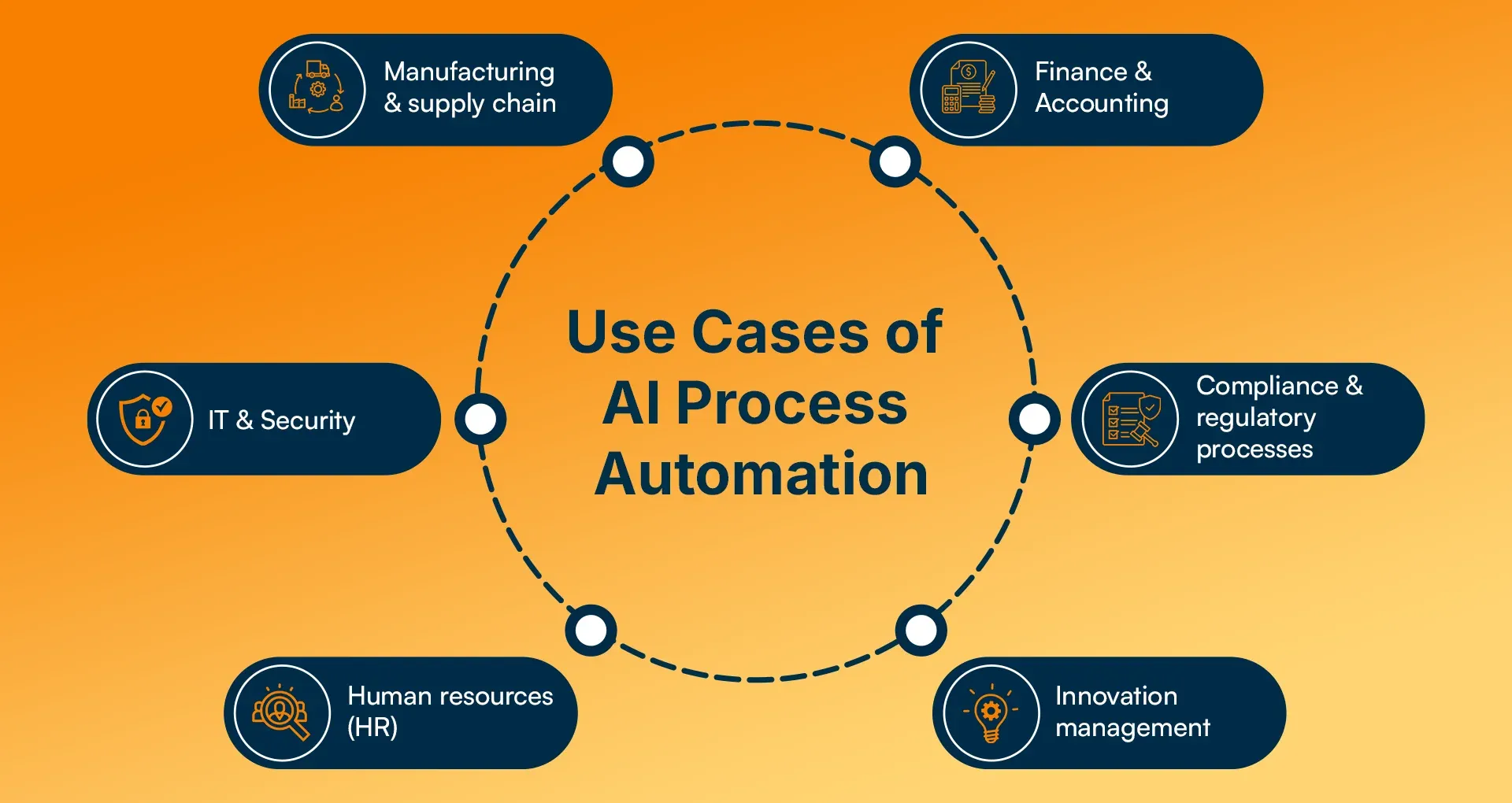
1. Finance & Accounting
AI-powered automation in finance enhances accuracy, streamlines operations, and ensures faster processing of financial tasks. It eliminates manual errors, accelerates decision-making, and improves compliance across financial systems.
-
Automated purchase requirements: AI automates the purchase requisition process by initiating, validating, and routing requests for approval, ensuring procurement policies are followed while reducing delays.
-
Fraud detection using real-time analytics: AI systems analyze transactional data in real-time to detect anomalies and flag suspicious activities, helping organizations prevent fraud and financial losses quickly.
-
Expense and travel approval workflows: AI streamlines travel and expense claims by auto-verifying documents, checking against policy rules, and routing approvals to relevant authorities without manual intervention.
2. Compliance & Regulatory Processes
I saw that mostly advanced AI tools ensure that organizations meet regulatory requirements by continuously monitoring, analyzing, and reporting on compliance metrics. It simplifies audits and enhances transparency.
-
GDPR and AML compliance tracking: AI monitors user data and financial transactions in real-time to ensure compliance with GDPR and Anti-Money Laundering regulations, reducing legal risks.
-
Contract approvals: AI automates contract workflows by reviewing, validating, and routing legal documents, reducing approval times and ensuring consistency in terms and conditions.
-
Automated audits: AI tools gather, analyze, and organize audit-relevant data, making it easier to conduct internal audits with minimal human input and increased accuracy.
3. Innovation Management
AI supports business innovation by optimizing project decisions, identifying trends, and reducing operational inefficiencies throughout the innovation lifecycle.
-
Project lifecycle evaluations: AI platforms evaluate project feasibility, ROI, and strategic alignment, providing insights for faster and more informed approval of innovative initiatives.
-
E-vetting and tender processes: AI automates vendor evaluation by analyzing proposals, credentials, and past performance, enabling quicker and more objective decision-making.
-
Market trend analysis: AI scans industry data to detect emerging technologies and competitor strategies, offering valuable foresight for future product development.
4. Human Resources (HR)
AI empowers HR teams to automate time-consuming tasks and improve decision-making related to hiring, training, and performance management.
-
Employee onboarding and training: AI automates document collection, task assignment, and training schedules to streamline the onboarding experience for new employees.
-
AI-based performance appraisals: By using real-time data, AI assesses employee productivity and provides feedback to deliver fair and timely performance evaluations.
-
Talent and internal mobility planning: AI identifies skill gaps, maps growth paths, and suggests internal roles for career development based on employee data and trends.
5. IT & Security
AI enhances IT operations by automating support, tracking assets, and proactively managing security threats before they escalate.
-
Chatbot-based ticket resolution: AI-driven chatbots resolve user issues by logging, classifying, and responding to common IT support queries without human intervention.
-
IT incident and asset tracking: AI tracks hardware and software usage, logs incidents, and helps ensure assets are properly monitored and maintained.
-
Proactive threat identification: AI scans network activity for unusual behaviour, enabling IT teams to detect and respond to cybersecurity threats in real-time.
6. Manufacturing & Supply Chain
AI helps manufacturers and logistics teams boost efficiency, reduce downtime, and enhance inventory management through automation.
-
Predictive maintenance: AI monitors equipment health, predicts potential failures, and schedules maintenance proactively to reduce downtime and repair costs.
-
Inventory and demand forecasting: AI analyzes historical data and market trends to forecast demand and optimize inventory levels, minimizing overstock or stockouts.
-
Automated logistics planning: AI automates routing, scheduling, and fleet management tasks, ensuring faster deliveries and efficient logistics operations. Nowadays, automation processes are being used a lot in the sea exports business also.
If your business also falls in these 6 categories, then you can guess in which operations using AI process automation will help you. Apart from this, if your business falls in any other category, then before implementation, you should audit the workflow of your business and take advice from experienced firms.
Understanding AI Process Automation and Intelligent Automation
Organizations are increasingly adopting automation to streamline operations, but not all automation is created equal. Let's know how Process Automation, AI Process Automation, and Intelligent Automation differ in functionality and impact.
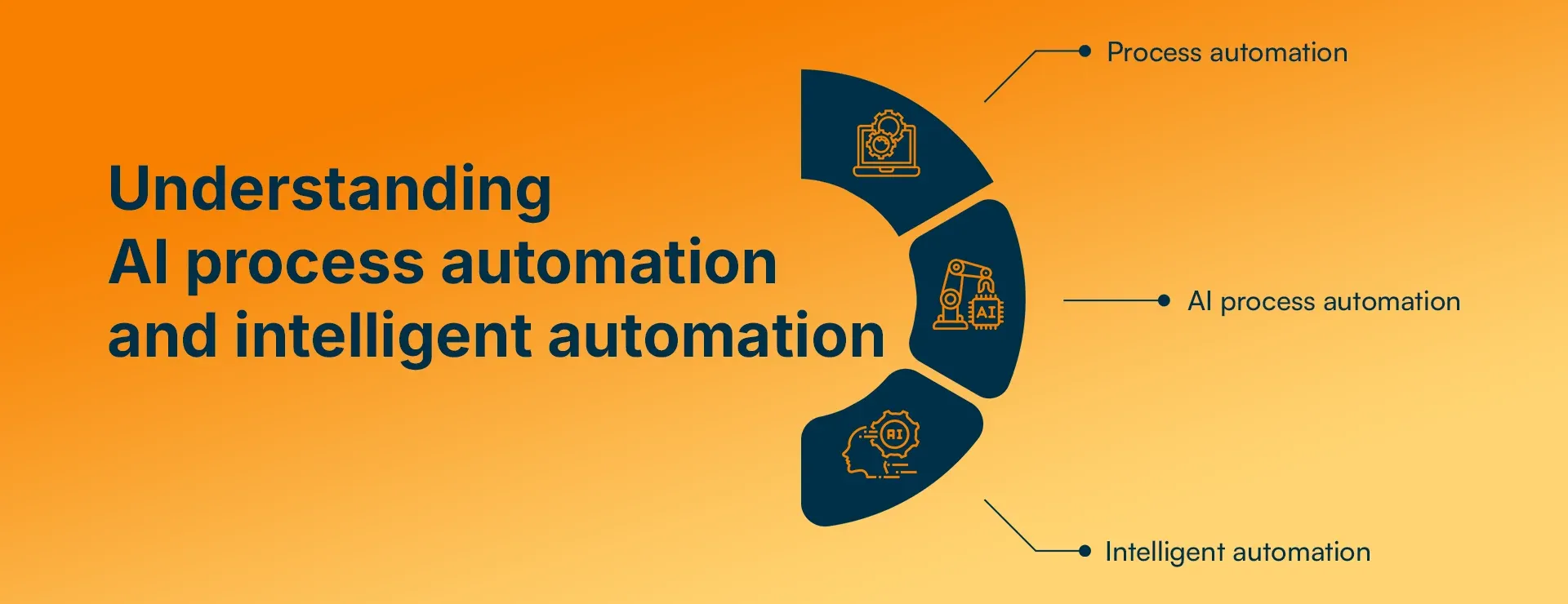
-
Process Automation: This form of automation uses Robotic Process Automation (RPA), Business Process Management (BPM), and orchestration tools to handle repetitive, rule-based tasks. It's ideal for automating standardised workflows like data entry and report generation.
-
AI Process Automation: AI Process Automation goes a step further by incorporating machine learning, natural language processing, and analytics. It can learn from data and make intelligent decisions, making it perfect for tasks that require adaptability and contextual understanding.
-
Intelligent Automation: This automation, also known as Intelligent Process Automation, and this approach combines AI, RPA, deep learning, and advanced analytics to automate entire business systems. These systems operate autonomously, learning and improving without the need for human input.
Analogy: You can think of AI Process Automation as your smart assistant, which is capable of learning, adapting, and assisting. On the other hand, Intelligent Automation acts as a fully autonomous operations manager, running end-to-end systems without human involvement.
Top Latest Trends in AI Process Automation
Many experts believe that AI process automation continues to evolve, which will improve efficiency and innovation across industries. Let us know about the top trends of 2025, which will evolve significantly in the future.
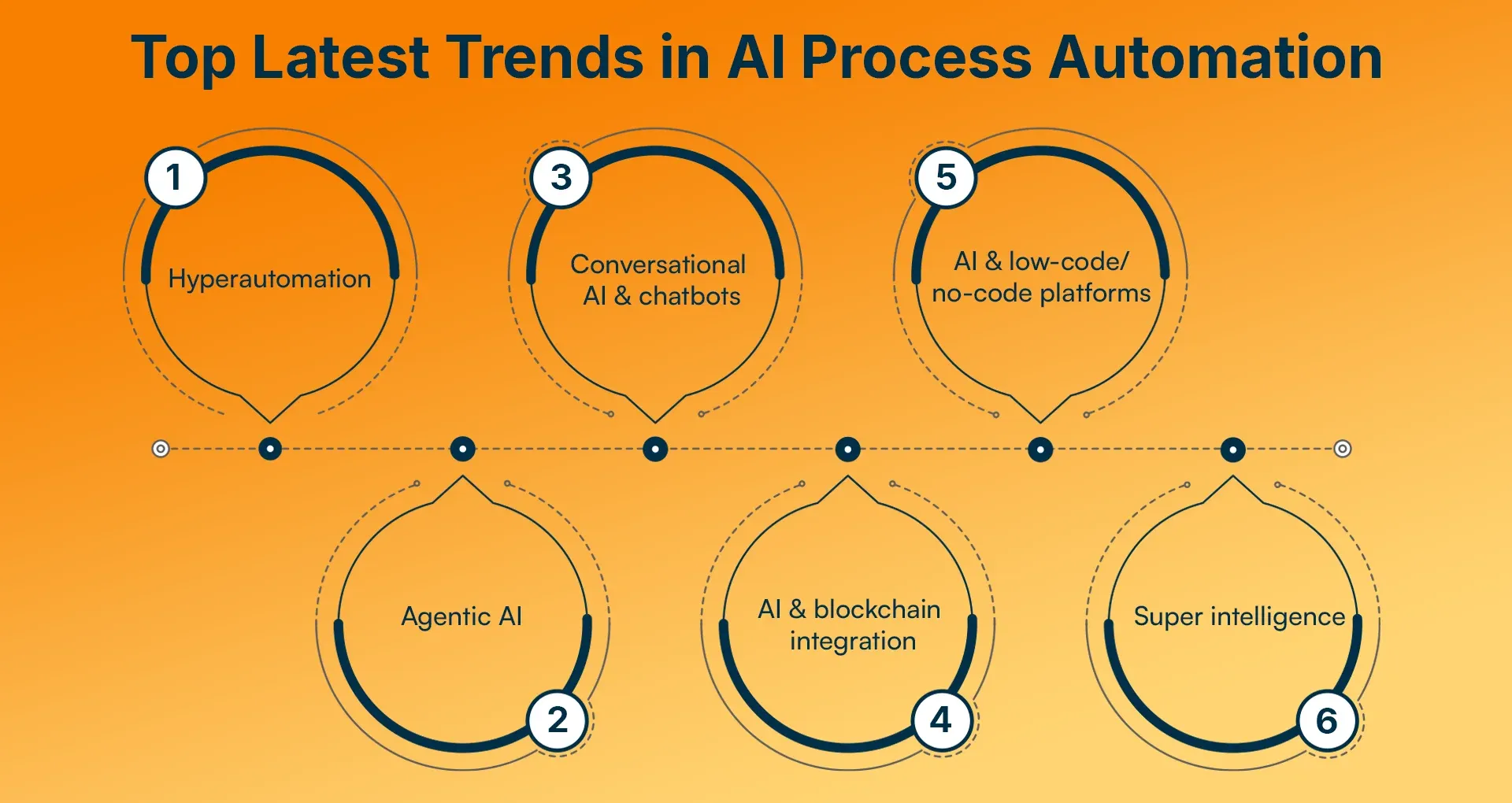
1. Hyperautomation
It was started by Gartner, hyperautomation is seen as the future of enterprise automation. It involves an integrated, layered approach that combines AI, RPA, advanced analytics, and orchestration to automate complex end-to-end workflows. According to most experts, 'Hyperautomation" will get a lot of priority in sectors like Healthcare.
2. Agentic AI
Agentic AI systems operate autonomously and make proactive decisions. These always-on systems analyze real-time operations, detect issues, and act immediately to resolve them with minimal human intervention.
3. Conversational AI & Chatbots
Most modern AI chatbots are context-aware, emotionally intelligent, and support multiple languages. They are transforming customer service, HR, and IT support by offering 24/7 assistance and reducing wait times.
4. AI & Blockchain Integration
By combining AI's analytical power with blockchain's transparency and security, businesses can create tamper-proof automated systems. This is particularly useful in healthcare and supply chains for audit trails and data integrity.
5. AI & Low-Code/No-Code Platforms
Many platforms provide no code features and with drag-and-drop builders and AI assistance, non-technical users can now create sophisticated workflows. These platforms accelerate deployment and democratize automation across departments.
6. Super Intelligence
I think AI will be expected to surpass current capabilities by acquiring emotional intelligence and the ability to self-improve. This "super intelligence" will help humans make better decisions and manage more complex tasks.
Best AI Process Automation Tools
When you choose the right AI process automation tool, it can significantly impact your organization's productivity and innovation. Below are some of the top tools offering powerful AI-driven features for modern business needs, and I will also try to give some personal recommendations.
1. FlowForma
FlowForma is a user-friendly no-code automation platform designed for enterprises. Its AI Copilot provides real-time workflow suggestions and helps build forms using natural language prompts. Seamless integration with Microsoft 365 and predictive analytics makes it ideal for HR, finance, and healthcare teams.
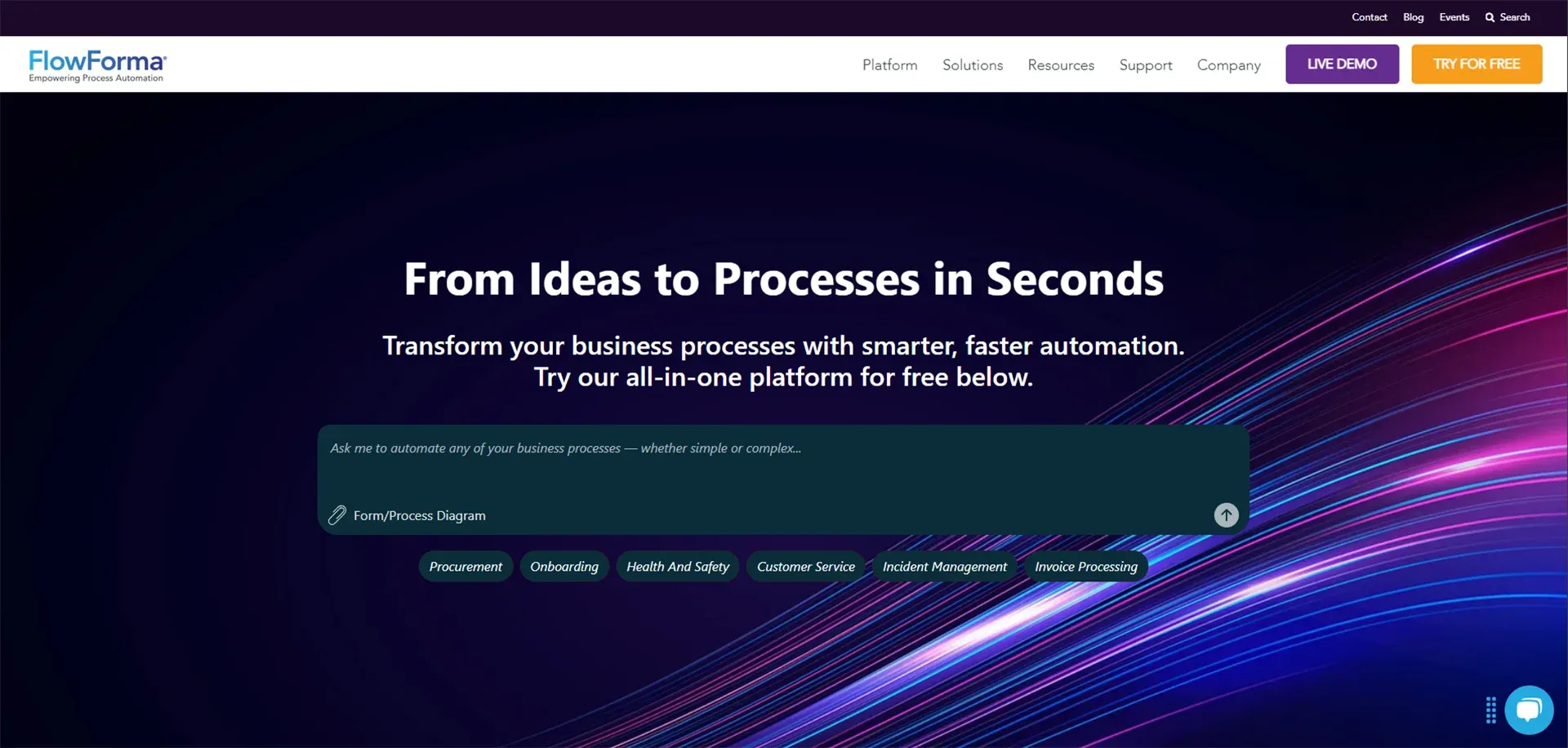
2. Automation Anywhere
This platform leverages Generative AI and IQ Bot to automate complex tasks using plain language commands. It offers advanced RPA capabilities and supports cloud and hybrid deployments, making it suitable for large-scale operations.
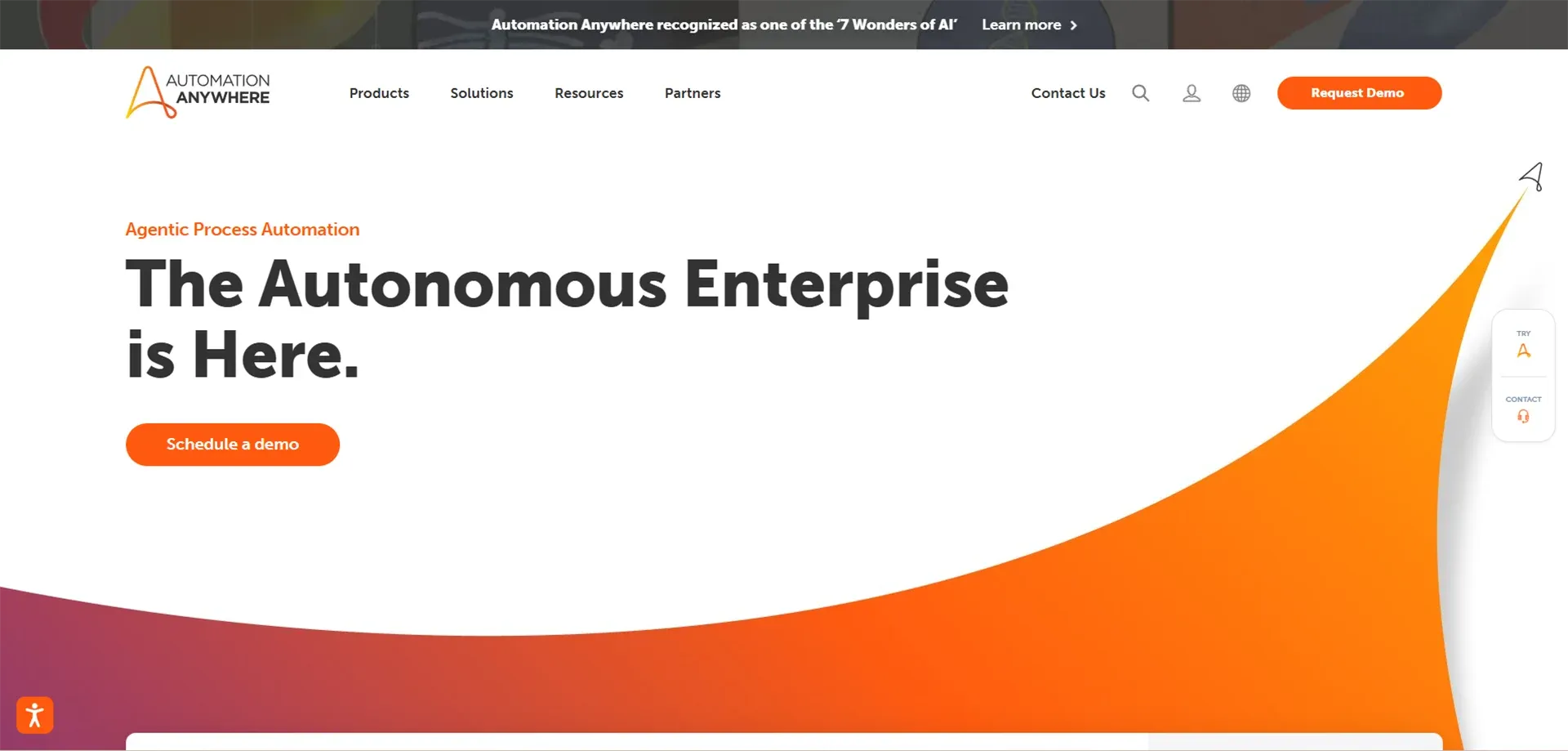
3. Creation
Creatio combines CRM and workflow automation on a no-code platform. It delivers predictive insights, AI-assisted process design, and optimization tools, empowering users to build and adapt workflows without technical expertise.
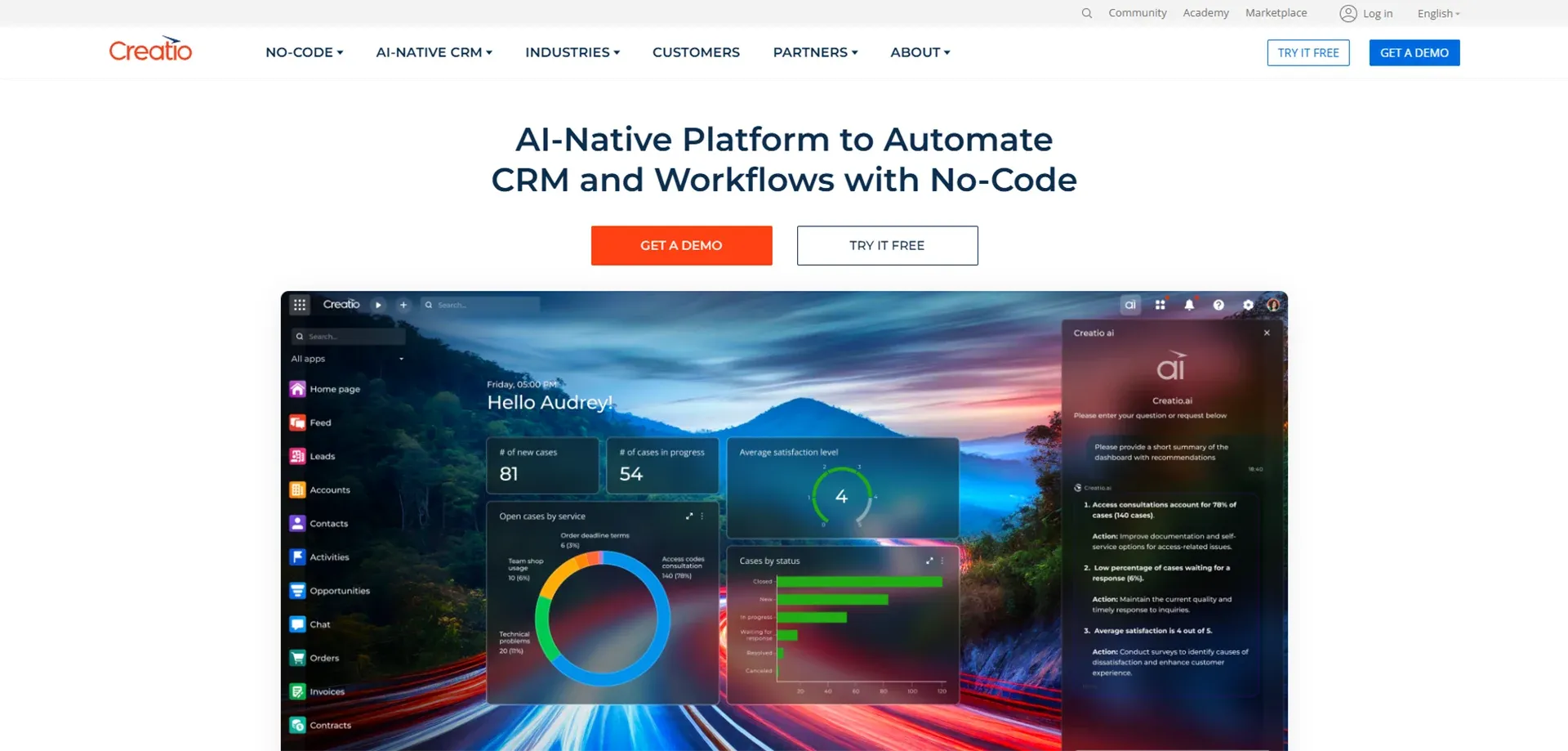
4. Microsoft Power Automate
It's a part of the Microsoft Power Platform. Power Automate is a low-code tool that integrates with Microsoft 365, Azure AI, and Dynamics 365. It features AI Builder for sentiment analysis, OCR, and decision automation, ideal for enterprise environments.
If you like Microsoft's ecosystem, then you may prefer Flowforma.
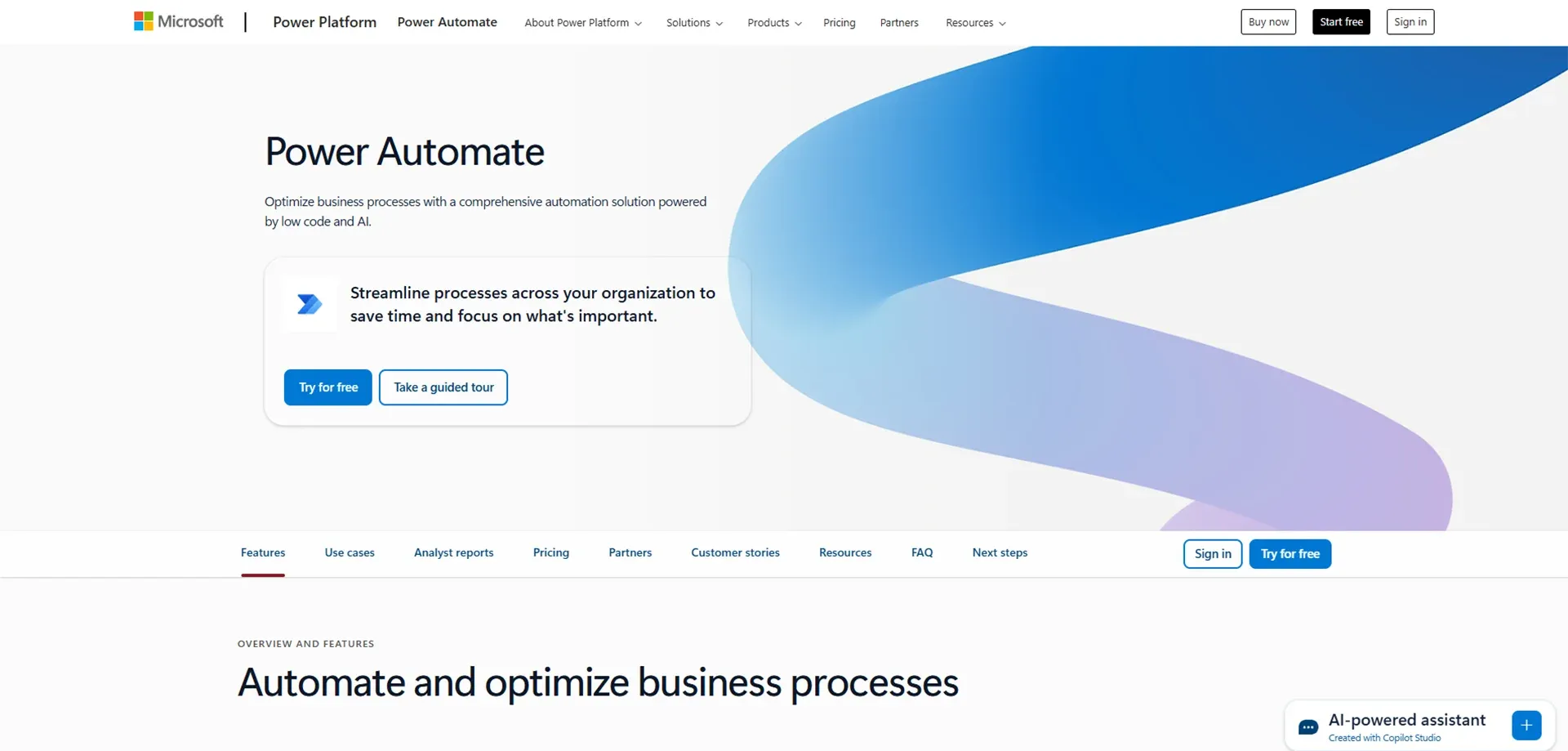
5. Nintex
Nintex offers process mapping, automated document generation, and task management. Its AI tools help identify repetitive tasks suitable for automation and provide recommendations to improve workflow efficiency.
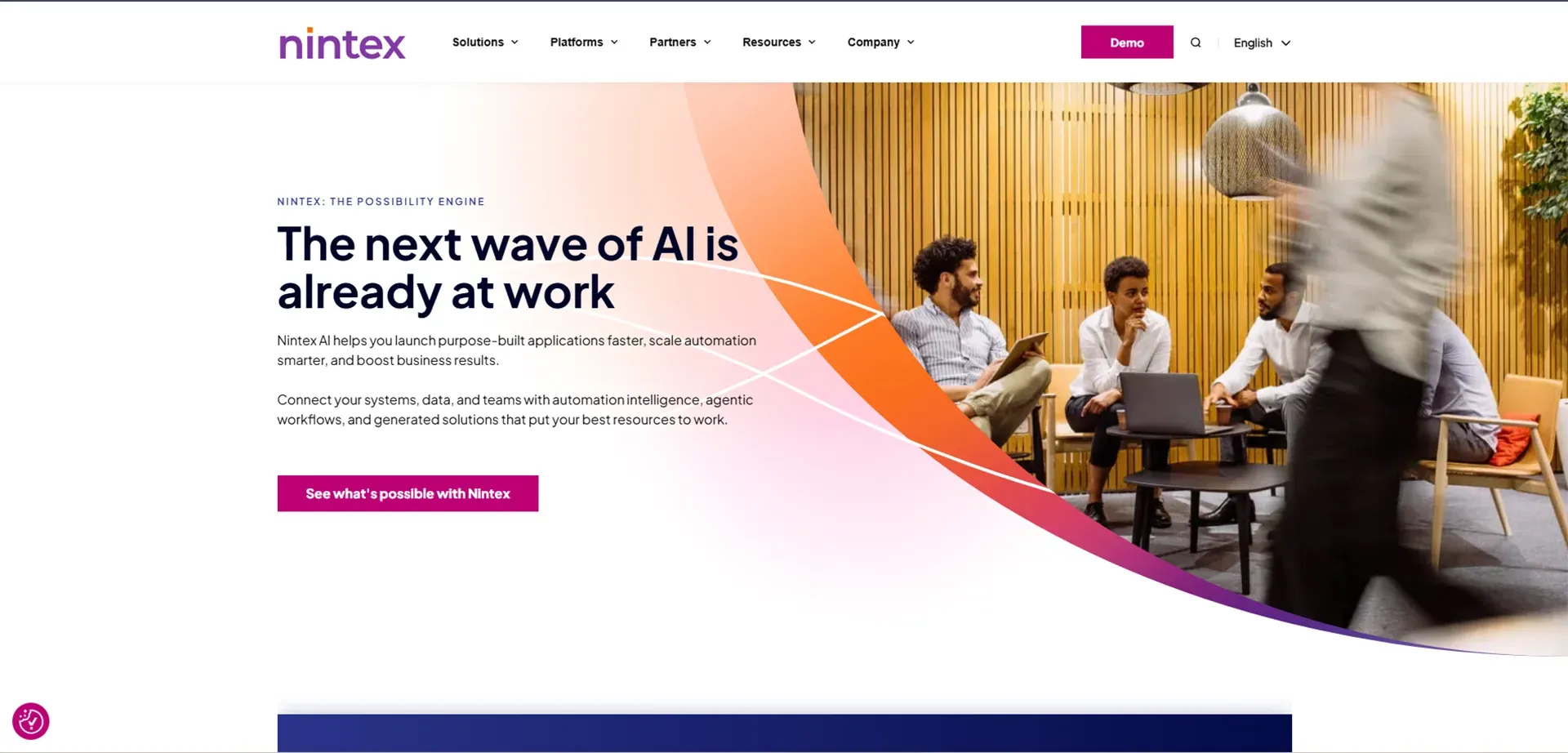
6. Kissflow
Kissflow is known for streamlining HR, procurement, and project management workflows. With low-code features and AI-driven insights, it helps businesses detect bottlenecks and optimize processes with minimal manual intervention.
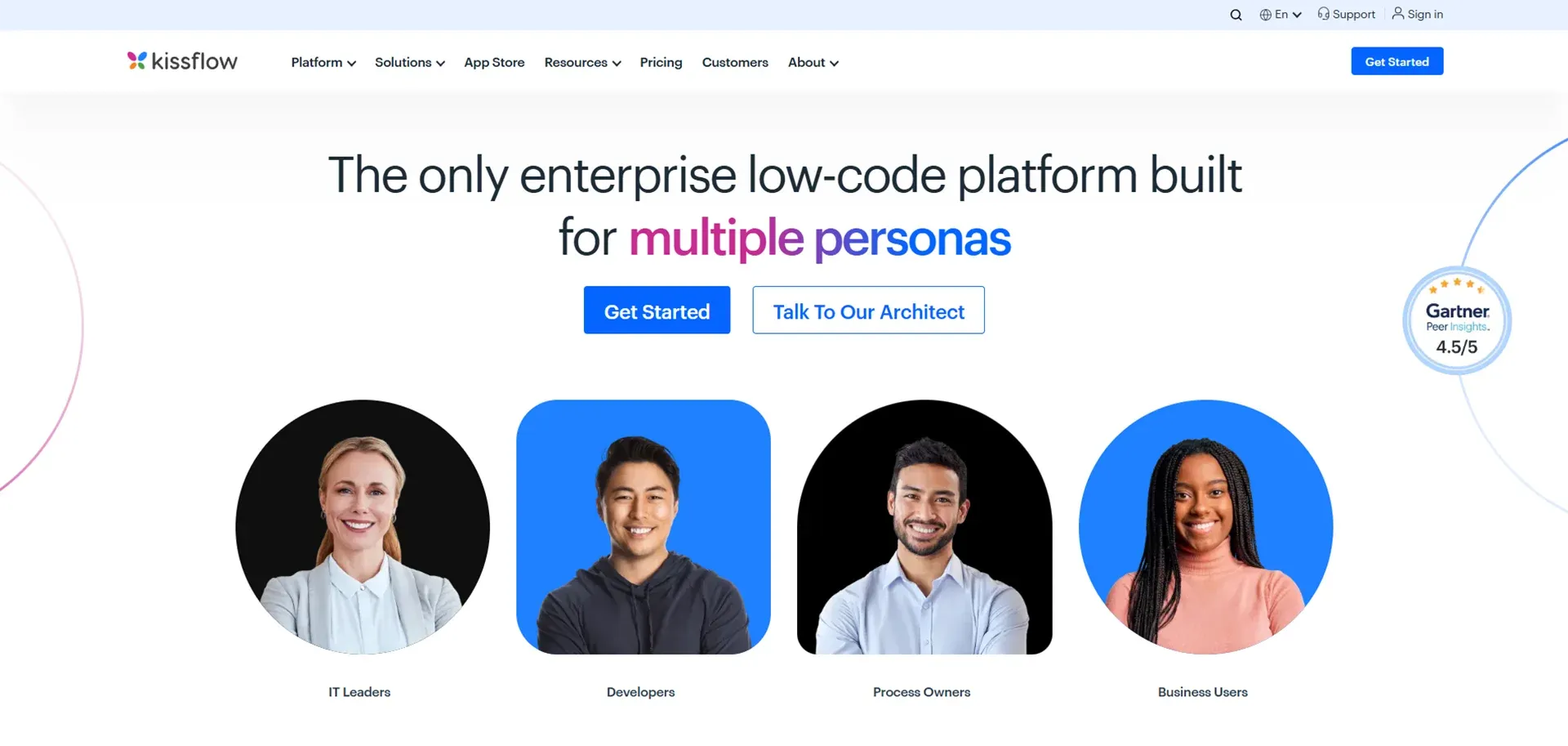
Apart from this, if you do not have much clarity about AI process automation or deploying it, you can choose reputable firms like RejoiceHub, which will provide you with services ranging from best recommendations to deployment support.
Conclusion
AI Process Automation is not just a special technology but a game-changing capability that businesses can use to automate and streamline their operations with an AI-driven system. Whether you're in finance, healthcare, HR, or IT, the possibilities are immense.
Whether you will get good ROI or success in AI automation largely depends on your clear strategy. When you use the right AI company or tool, it will yield profitable results for your business in the long term.
As someone deeply involved in the AI ecosystem, I can assure you that the earlier you start, the bigger the advantage you can feel in your business ecosystem
Frequently Asked Questions
Q1: What is the difference between RPA and AI process automation?
Actually, RPA follows rules, and AI process automation makes decisions using data and learning.
Q2: Can AI automation be used without coding knowledge?
Yes, platforms like FlowForma and Microsoft Power Automate offer low-code or no-code solutions. But for complex automation, you will need custom code solutions.
Q3: How safe is it to use AI automation in finance?
With proper data governance and security protocols, AI can improve accuracy and reduce risk in finance.
Q4: Will AI automation replace human jobs?
It will transform roles by removing repetitive tasks, enabling humans to focus on strategic and creative work.
Q5: How do I start implementing AI process automation?
You start by identifying repetitive tasks, choosing a scalable AI tool, ensuring data readiness, and training your team.
Q6: What industries benefit the most from AI process automation?
This is the current trend, according to which industries like finance, healthcare, manufacturing, telecommunications, and the public sector see the most benefits due to their heavy reliance on data, repetitive workflows, and compliance requirements.
Q7: How does AI process automation improve customer experience?
AI automation enhances customer experience by speeding up response times, personalizing interactions, and reducing errors. For example, AI chatbots can resolve queries instantly, while automation ensures consistent and timely service delivery. This increases customer trust and loyalty.
Q8: What’s the ROI of implementing AI process automation?
The ROI varies by industry and use case, but many businesses report significant cost reductions, improved productivity, and faster processing times. According to reports, some organizations save up to 40–50% on operational costs within the first year.
Q9: Can small businesses use AI process automation, or is it only for large enterprises?
Absolutely, if you're a small business owner, you can also use AI process automation and with the rise of low-code and no-code AI platforms, small businesses can now automate key processes without a dedicated tech team.
